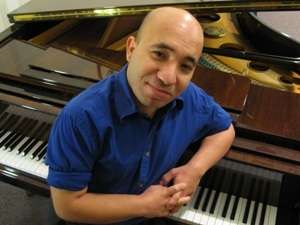|
Back
Anniversary Celebration (With Guest Composers) New York
Weill Recital Hall, Carnegie Hall
06/01/2013 -
Alexander Scriabin: Prelude in B-flat Minor, Opus 37, No. 1
Sergei Rachmaninoff: Piano Sonata No. 2 in B-flat Minor, Opus 36 (Revised Edition) – Prelude in G Major, Opus 32, No. 5
Modest Miussorgsky: Pictures at an Exhibition
Scott Robbins: I Colored a Wanted Music I Can Always Hear (World Premiere)
Gamal Abdel-Rahiem: To Our Revolution’s Martyrs (U.S. Premiere)
Wael Farouk (Piano) 
W. Farouk (© Courtesy of the Artist)
Was it audacity or simply an immense personal challenge that 32-year-old Wael Farouk chose not only to specialize in Rachmaninoff but to celebrate the 140th Anniversary of his birth yesterday at his recital?
The Russian composer had probably the largest hand-span in pianistic history, writing music for his performances. Mr. Farouk, though, is not only small of stature, but it is well known that a birth defect prevents his hands from straightening or making a fist.
Yet somehow, Mr. Farouk, who entered his native Egyptian conservatory at the age of seven, was able to work around these problems. And in this, the first recital I had ever heard him, he turns out to be not only an energetic pianist but one whose technique, good taste and fine lyrical sense was put to good use.
This was not all Rachmaninoff. Mr. Farouk played another Russian virtuoso, Alexander Scriabin, born a year earlier than the celebrant. (And partly due to excessive drinking, dying three decades before Mr. R.) And he finished with a meaty rather exciting Pictures at an Exhibition by Mussorgsky, who died when Rachmaninoff was only seven.
The program began with a Scriabin Prelude executed with perhaps an over-expressive torpor. Scriabin described it as sad, yet Mr. Farouk, while never allowing it to sag, did lounge precariously on the cusp of the lugubrious, while never actually deflating it.
Rachmaninoff’s familiar G Major Prelude was played with a lean melodic melody. But the Rachmaninoff Second Sonata was perhaps the greatest challenge of the afternoon. When played by a Horowitz, the difficulties are not only sailed over, but he simply throws them aside to reach the brutal innards. Mr. Farouk rarely let us see the soul beneath the digits (except in the passionate slow movement). Perhaps one was so astonished by the excellent playing that the emotional pit (especially of the Allegro molto finale) was never reached. Yet, if this was more spectacular than sensuous, it was a splendid performance.
Mr. Farouk introduced us to two premieres. The late Egyptian composer Gamal Abdel-Rahmien must have been a fine pianist, for his two-movement piece To Our Revolution’s Martyrs (an unfortunate name, echoing the trashiest Stalinist music of Shostakovich and Prokofiev), was far better than its title. The Elegy was like a chaconne, with bass bells obviously in mourning for the fallen dead. Clash was more martial, with hints of Chopin and even Scriabin. It was easy listening for apparently a difficult subject.
The world premiere of Scott Robbins’ I Coloured a Wanted Music I Can Always Hear was dedicated to Mr. Farouk, the title coming from his son’s attempt at a Japanese haiku. It was almost a singularly marvelous piece. The Japanese echoes of the first theme were not as important as the delicate subtle melody itself, given some equally delicate variations.
My thoughts were that if Mr. Robbins could retain that atmosphere, he would have something akin to a Debussy prélude, for the Frenchman was very much a lover of all things Japanese. But perhaps Mr. Robbins wanted to give something more substantial for Mr. Farouk’s talents, and he continued with a section that, while never bombastic, somehow devalued the gracious almost elusive beginning. Needless to say, Mr. Farouk handled this with aplomb, assurance and a touch appropriate to Weill Recital Hall’s splendid Steinway.
Harry Rolnick
|